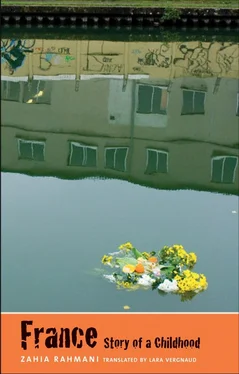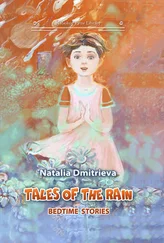They built quickly atop a buried town. Yet the history of the place warned of shaky ground. But what could five widowed daughters do before the arbitrariness of a newly elected official who expropriated their lands? A dark decade extolling God’s justice inflicted this indignity on you. In short, your father died a second time. A poorer man. Five daughters whose existence must always remain shameful. They left a small plot of land to each of you and new constructions blurred the landscape of your childhood. One from before time was erased. However, the rumor goes, the cinder block towers will one day fall into the ocean. They’re already sinking.
Emma Halima—your mother, my grandmother—built your family home up high, hidden under the trees. She carefully painted the interior of the stone square structure, whose ruins you would later unearth. They say that even though my grandmother was strong enough to lift three men, there was no better testament to the respect she had for nature and its creatures than in her actions. In Algeria, such was her medical knowledge that more than once she saved me as a child, to the surprise of the doctors who predicted I wouldn’t make it. Your delicate demeanor and appreciation for silence comes from her. Your father had an engraved copper chest containing all his precious objects, including his books. He used to read in English, Arabic, and French. He worked little and traveled a lot, too often for his family’s liking. As a child, I continually shut myself off to your past. I listened to you describe your childhood as happy, and I made myself forget it. I had inherited a revolution that brushed away family sagas. In Algeria, they destroyed a miserable past for a unification with no future. I refused to believe that before, in this country of men without rights, some had spread joy by holding on to their lore and their dignity. About this, your memory never faltered.
I should tell the story of how a saber sliced off your father’s fingers . . .

According to legend, a cargo of gold from a German ship that sank during World War I washes up on your shores. Once the water is calm, men set out across miles of steep rock looking for bullion. This seductive cargo forces the French military to enlist the local caïds to use their influence against the clans and the thieves. There are certainly plenty of the latter in this impoverished region, where people robbed of their futures, and unable to flee, are starving. In springtime, the search resumes and lasts for several years until a rumor reveals that one family (whose name I omit out of respect) had made off with the treasure. The family is brought in for questioning, but refuses to return what is theirs by right. The authorities try to make them listen to reason, they talk, they negotiate, new alliances and promises to come, but nothing works. The family doesn’t want to relinquish the gold to the occupiers. Among the people of Kabylie, honor is at stake. A man is as good as his word, and your uncle—a caïd perched on his sorrel, proudly wearing a burnoose embroidered with gold thread, a white turban, and black leather boots—had given his to the French. The clans challenge each other and it’s war against family X. There’s a sword fight on horseback in the largest square in town. In the history of Kabylie, you say, no one had ever witnessed a greater spectacle. Your uncle is killed, and your father, though he had refused to act as judge (having taken a vow of wisdom and piety), finds himself in the fight as a result. With one fell swoop his hand is cut. (You become so animated each time you describe what the warriors are wearing that for a long time I believed you had witnessed the scene firsthand.) The army steps in and arrests all the warring parties. There is a trial. Fifteen men, including seven from your family, are found guilty. Deported to Devil’s Island. Your father’s one of them. He will stay there only a few months. When he returns, he’ll want to free his relatives and will dedicate everything he has to endless judicial proceedings. He’ll rent out his lands and find employment in France, Spain, and England. He will bring them all back. Every last one. But the interminable legal battle leaves its mark. It alienates your mother, Emma Halima, for a time. The daughter of a theologian who was the head of a very old brotherhood, she shuns conflicts between Muslims. Especially when they benefit the occupier. She leaves your father to protect her name and that of her forebears. The separation will last seven years. You’ve just turned three years old. For seven years, you and your family resignedly accept this temporary divorce caused by a profound disagreement among kin. I belatedly understood the strength of your bond with your father. You lived with him during those years of estrangement, reuniting with your mother only occasionally, at night and in secret, because of the code of honor giving her the right, so rarely invoked, to leave husband and children for dignity’s sake.
This woman, your mother, whose very beautiful portrait you bequeathed to me, allowed herself to be photographed without a headscarf. People have written here and there that women uncovered their heads at the behest, and to fulfill the needs, of the French administration. They wanted this rumor to be true, given all that it implies about the colonial interlude and its humiliations. But you have only to see my grandmother’s face to discover an entirely different story—that of a woman of astounding pride who appears exactly as she did in life. Strong-willed and happy with little. She was satisfied with reigning, even from a distance, over her hill facing the sea.
Below her shoulders, the open folds of her burnoose reveal a chest covered with metal brooches and tassels. Two braids frame her face. They are tied with thin cotton threads.
As a child, I liked to believe that in reality she was the granddaughter of a great Indian chief. A Cherokee far away from his American lands. In a fit of pique, my ancestor would have left his people in search of a Homer who could teach him the secrets of the beggars, the hungry European masses encroaching on his territory as if on promised land.
Passing the Strait of Gibraltar, and seeing in the distance some Roman vestiges dominating the port of the town of Tigzirt, he would have come closer. Seeking shelter first on an island off the coast, he saw in these people dressed in woolen blankets, in these calm and peaceful men ignorant of deep-sea fishing or slavery, a certain resemblance to his brothers. He advanced and made shore. They welcomed him, he made himself understood, and they knew that he was a good man. Then they wished him a happy union with a noble family and my grandmother, his descendant, was their worthy heir.
In France, I could have nothing but unusual and heroic ancestors. This transfer of family history through fable occurred thanks to my mother’s skillfulness. All other realities were denied me. My people weren’t a part of the history of man. I didn’t even have a people. I came from no one. My kin never entered the human adventure. They were neither discoverers nor vanquishers and made the mistake of never putting an end to anything. Absent from history are the silent, the eternal dreamers struck by the warrior as they sleep. The dreamers, who didn’t know that such violence could befall them, hadn’t armed themselves. And I, whom they trained with sword and spear, had to become a conqueror or die.
The walls of this attic room host the few drawings that my brother traced in black ink during what we both called our American readings. Mounted Yankee soldiers cavort with cowboys and gallop out of a canyon, swords drawn, as if heading toward a battle taking place right in front of us. Opposite them are Indians momentarily frozen around a fire, casting shadows on their canvas tepees. The wall evokes a calm and serene feeling that makes me think my brother identified with these figures. A supplicant holding out his hands is painted in another spot, copied from a book of photographs of Chinese sculptures taken at a recently unearthed burial site. The discovery of hundreds of life-sized models, captured in the movement of a procession, shocked the world. A rich prince had wanted his subjects to accompany him. He arranged their statues in his sepulcher, giving humanity a three-dimensional snapshot of his people exactly as he wanted them, fervent and distraught over his death. The shadow of a male Medusa appears on the last wall, straight out of a Moebius comic strip. A woman’s naked and languid body is reclining against his head, a metamorphosed string of algae that offered me a glimpse of feminine confidence exposed in all its sensuality. My father never came to this place, yet still reproached us for spending too much time here, escaping him. He saw this attic room as nothing but a void whose inner workings eluded him. It’s a miracle that our refuge, which welcomed each of my siblings and me as if into our own kingdom, has kept these traces of our adolescence, this shadowy setting intended as an homage to our readings.
Читать дальше



![Джеффри Дивер - Where the Evidence Lies [A Lincoln Rhyme Short Story]](/books/403782/dzheffri-diver-where-the-evidence-lies-a-lincoln-r-thumb.webp)
![Джеймс Чейз - The Mirror in Room 22 [short story]](/books/421068/dzhejms-chejz-the-mirror-in-room-22-short-story-thumb.webp)








